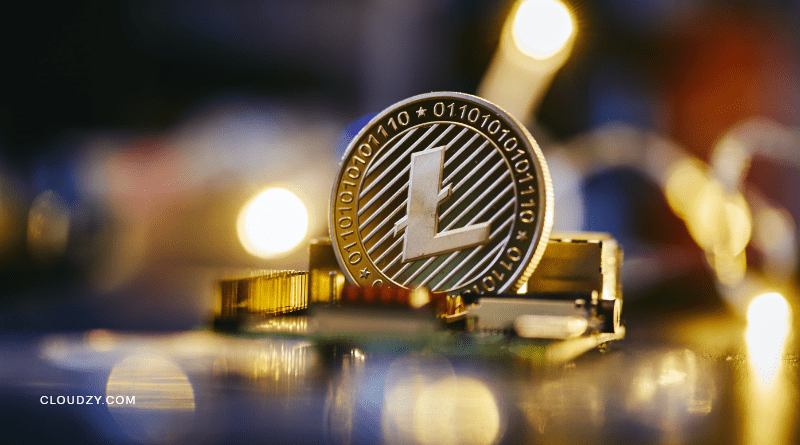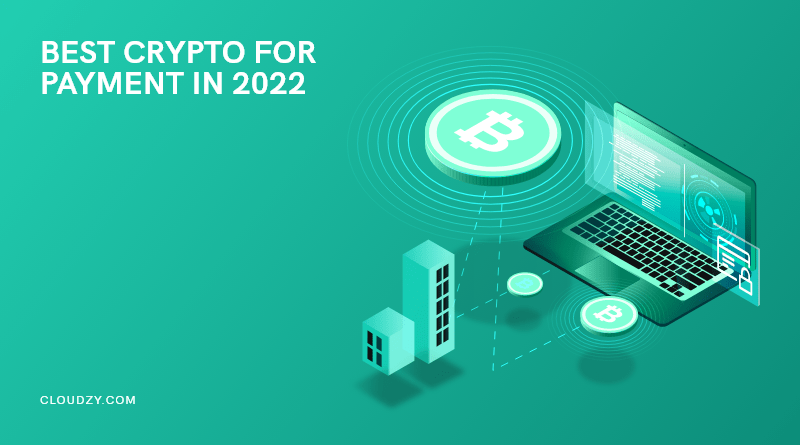By 2022 cryptocurrencies have swept the world to become a powerful market in their own right. But as their popularity becomes more widespread, many questions are raised on how to best integrate them as part of the mainstream financial environment. After all, distributed ledgers used as currency are a far cry from the traditional financial means we’re all used to. Still, the point stands. One of the main questions raised after moving past the basics is, “Which is the best crypto for payment?”.
This is more important than it seems, and there is no clear answer for it. After all, as part of a speculative market, the power of any cryptocurrency is best laid out by its potential to make payments. The ability to make these payments determines that currency’s ability to do what is considered the dream for many of these currencies. To be efficient enough to replace traditional means of payment. The wide range of available selections and the inherent complexity of cryptocurrencies can cause confusion. But let’s start with the basics and go over the candidates for best crypto for payment one by one.
What Makes A Cryptocurrency Efficient in Payment?
There are several key variables that make a cryptocurrency better than others in payment. Not all cryptos were made equal. Some cater to specific needs that do not have to do much with payment, as ironic as that may sound for a currency. But what exactly contributes to certain cryptos being better as payment options?
Blockchain Efficiency
By far, the most important factor that makes or breaks the ability of a crypto to be used as means of payment is how efficient is their host blockchain in making the payment happen and confirmed. Note that a faster blockchain does not necessarily mean a better crypto for payment. For example, Tether’s USDT stablecoin, when used on a TCR-20 blockchain host, is exceptionally fast in making transactions, and it’s best suited for everyday payments. However, bitcoin, which is hosted on a slower blockchain, is still appealing. It is considered the mother of all cryptocurrencies. As such, many prefer to receive larger payments this way despite the slow blockchain.
Transaction Fee
Traditionally, most forms of payment in human history have involved a form of a fee being paid to a third party that facilitates the payment. And despite the liberating ideas of certain cryptos, this payment fee still exists within the cryptocurrency market as well. Now, some cryptos are much more expensive to use as a means of payment. This is because their blockchains use a much higher network fee. Generally, this fee is used as a reward drop for the people who power your transaction via their mining devices. Still, I don’t think there’s anyone who wants more in fees when making a payment. Again, Bitcoin can be an exception here. Sometimes larger fees are justified by other advantages a crypto can offer.
Security
Last but not least, in the category of the things that make a crypto a candidate for being good at payments is their security. While blockchains are generally quite safe from outside attacks, it is still advised to verify the integrity of the blockchain that hosts a certain crypto. A good rule of thumb is to use already established and well-known currencies to make payments and to avoid backwater and lesser-known cryptos. Remember, this is a distributed market, and you make your own fate. So should anything happen to your money in a botched crypto payment, nobody is gonna act as your insurance policy. This story by Forbes should work as a good reminder to always be on the lookout when dealing with cryptos for payment.

What “Type” of Crypto Should I Use for Payment?
Moving on from efficiency, we are confronted with another matter. And that is the “type” of crypto that we’re going to use to make our payment as optimal as possible. Yes, cryptos have “types” just like us. What are these types? What is the main difference between them? And Which ones make them better suited for payments? These days cryptocurrencies are a hot topic in the regulation circles of different countries. There are some generalized definitions of different types online. But for the sake of clarity, I’m gonna use the definition outlined by the Financial Conduct Authority (FCA) of the United Kingdom and its Crypto Asset Taskforce.
Security tokens
Tokens that give rights to ownership, capital return, or a part in future profits. They might be transferable securities under the EU’s Markets in Financial Instruments Directive II (MiFID II). This is the legislation that supports the great majority of financial decisions in Europe. Security tokens are defined as coming inside the FCA’s regulatory limits and probably will be regulated in other regions as well. These are rarely used as payments and instead work as means of investing in crypto while remaining in a regulated framework.
Utility Tokens
Tokens that may be redeemed for special access to a product or service are known as utility tokens. Utility tokens are not subject to FCA regulation and are yet to be regulated in many regions of the world. While they have their very niche payment uses, their use in payment remains scant. However, it is more commonly used compared to Security Token.
Payment Tokens
Crypto-assets such as Bitcoin, Litecoin, or Bitcoin Cash are decentralized payment tokens with their own public blockchain. These are not issued by a central bank or political entity. These tokens are often used for trade, barter, and investing. When it comes to payment, these tokens are your bread and butter, and the overwhelming transactions performed through crypto happen with these tokens. It is generally believed that payment or exchange tokens should not be regulated in general.
Pros and Cons of Crypto Payment
As already outlined, there are considerations to be taken when we decide to use cryptos for payment. Before we can get to listing the best cryptocurrencies for payment, we need to take those considerations and transform them into a set of pros and cons. This will help us get a better image of what we’re dealing with.
Pros
- Potentially much faster transaction speed
- Lower fees in many cryptos
- Tax exemption. In many regions, regulation is yet to include cryptocurrencies
- Overall better security compared to centralized economic structures
Cons
- Perceived Risk. The public perception of risk poses challenges
- One-way ticket. Crypto transactions are irreversible and permanent
- No room for mistakes. There is no direct regulatory body to change unwanted effects
- Volatile Prices. What you paid yesterday could be worth more or less the next day.
The existing cons of cryptocurrency payment have caused the rise of Cryptocurrency Payment gateway to minimize these cons.
What Is a Cryptocurrency Payment Gateway?
A cryptocurrency payment gateway is a digital currency payment processor, similar to how payment processors, gateways, and acquiring bank credit cards work. Cryptocurrency gateways allow you to accept digital payments and get fiat cash in exchange. These firms eliminate any doubts or worries you may have about cryptocurrencies and enable you to provide more payment choices.
It should be noted that digital currency payment channels are optional. It is completely fine to accept bitcoin payments using your personal wallet; however, gateways remove the added burden of converting cryptocurrency and managing a wallet from your hands. One of the key ideas of cryptocurrencies is the elimination of third parties from financial transactions. While this may seem fantastic to those who welcome and understand change, it may not be acceptable to others. Cryptocurrency is a new notion that is difficult to grasp in a society where tangible goods have always had exchangeable value. Only lately have industrialized nations adopted a financial paradigm in which the majority of their transactions are credit and debt-based, with no possibility of exchanging actual money.
How Does a Crypto Gateway Work?
The program primarily allows you to select which payments you wish to take depending on what they provide. In certain situations, they may take more than 1000 coins, which are available on exchanges. Furthermore, if you only accept Bitcoin as payment for your goods or services, they may supply you with that feature. Some cryptocurrency payment gateways will not only give you a non-custodial wallet, but they may also offer exchange and conversion services. If you already have wallets for several cryptos, you may be able to connect them straight to avoid exchanges and save even more money in the long term.
In one example, an American company chooses to accept a wide range of cryptos for their goods. As purchases are made in varying currencies, they are stored in non-custodial online wallets until the company converts them all to USD, which they then transfer to their corporate account. In another example, a Canadian company chooses only to accept Bitcoin for their goods, a common choice. Their payment gateway allows the connection of their wallet, so when customers make purchases, the BTC is automatically sent to the wallet provided, so no exchange to CAD is needed at that time.
Why Do We Need Crypto Gateways?
For a number of reasons, cryptocurrency payment gateways are required. They are all related to the decentralized nature of blockchain technology, which is why people appreciate crypto in the first place. Some of the major advantages of employing a cryptocurrency payment gateway will be:
- Low Fees: Crypto transactions are inexpensive, especially when compared to antiquated currency payment systems. For example, Crest card or debit card swipe costs may be roughly ten times more than the comparable crypto transaction.
- Security: Because blockchain technology necessitates repeated verifications from anonymous third parties, the network’s security and transparency are unparalleled.
- Speed: Many cryptocurrency transactions take place almost instantaneously. Payments may be transmitted and received in fractions of a second using the Bitcoin lightning network, rather than waiting several business days for an ACH or comparable transfer to also be completed.
- Simplicity: Most cryptocurrency payment gateways will ease the process of pooling your cash and configuring your conversions and transfers.
We can see that a Crypto Gateway combines all the elements that we’re looking for in an efficient crypto payment operation. Crypto Gateways provide a compelling case for use in the current crypto market.

So…Best Crypto for Payment?
Now that we have gone over all the essentials that we need to know before indulging ourselves in crypto payment, it’s time to take a look at the best options that we have. What are the best cryptocurrencies for payment in 2022?
Bitcoin: Your Reliable Cryptocurrency Partner

Getting the big obvious out of the way first. Bitcoin’s transaction speed is slower compared to some of the other currencies on the list. It can take as long as 1.5 hours to make a single transaction. Bitcoin is also expensive when it comes to fees. The average fee is 102 Satoshi/byte, which translates to around an average of $25 per transaction. Not cheap. However, BTC payment is how the vast majority of cryptocurrency transactions are done. Bitcoin is also considered the mother currency, with a lot of other currencies depending on it. Almost all gateways have bitcoin listed as a primary currency. Combined together, these easily make up for Bitcoin’s other shortcomings. And make it the premier cryptocurrency for payments all around.
 Flexible, Secure Payment
Flexible, Secure Payment
Get a Bitcoin VPS, which lets you pay for your virtual server with Bitcoin and other major cryptocurrencies.
Get a Bitcoin VPSEthereum: The Queen Always Shines

If this article had been written a year ago, maybe Ethereum, despite all of its advantages, would not have made the list essentially because it was reminiscent of Bitcoin in a payment aspect. However, with the implementation of better and improved algorithms, it has now become one of the best coin payment options out there. The transaction fee of Ethereum was once over $60. Now it is barely above a Dollar. The ERC-20 network has also improved its transaction time down to around 5 minutes. These improvements, coupled with the immense diversity and utility of its famous blockchain host, have made it popular enough to make it a premier crypto payment method.
Tether (USDT): Holding Fiat Money Scares me

Tether is a stablecoin token hosted on two different blockchains, TRON and Ethereum. Its status as a stablecoin signifies the fact that its value is always equal to or in extreme proximity to a US Dollar. Tether is quite useful for those who want to quickly use a store of value equal to USD on the online platform for online services. Its lack of volatility also makes it suitable for both businesses and consumers to regularly use it as an online currency. With the recent crash of Terra’s UST stable coin, Tether USDT is the most reliable stable coin payment option out there.
Litecoin: Silver to Bitcoin’s Gold

If for some reason, the already mentioned cryptos are not your thing, maybe you just have a taste for something different. Litecoin is probably for you. Litecoin is an early offshoot of Bitcoin with almost identical properties. Litecoin has four times the supply of bitcoin in circulation as well as a more efficient proof of work blockchain. Bitcoin combines Bitcoin’s unique security and store value with much-improved transaction fees and time. The transaction time is between 2 to 8 minutes compared to Bitcoin’s 1.5 hours, and the fee per transfer also falls much below Bitcoin’s hefty $25 fee at 0.03 Cents.
Conclusion
Crypto has reached unprecedented heights in 2022. Despite the recent market crash, Cryptocurrencies are determined to continue their drift towards the mainstream. It would not be far-fetched to say that soon, the mass adoption phase of crypto history will begin. Many businesses have already implemented cryptos both as payment options and in different financial service forms.
Cloudzy is one of the early adopters of cryptocurrencies as part of its services and payment methods. Cloudzy has established its prime VPS services with competitive prices and incremental maintenance periods compared to many of its rivals. So, the next step in Cloudzy’s evolution was to implement cryptocurrency payment methods and support masternode hosting. These include but are not limited to Litecoin, Ethereum, BNB, USDT, and Bitcoin payment options, now available with a user-friendly crypto gateway interface.
Try your hand in our crypto-powered VPS services, featuring not only the mentioned crypto payment options such as Bitcoin VPS, Ethereum VPS, and Tether VPS but many more.
FAQ
Is Crypto A Safe Payment Method?
Yes. Cryptocurrencies employ a highly decentralized processing system using blockchain technology that makes it one of the safest and most reliable methods of payment even compared to banks and other traditional financial structures.
Is Crypto Payment Available in Most Markets?
Not yet. The modern market and tech sector are divided. While many like Twitter, Tesla, and Meta have had positive feedback and have moved to implement crypto payment gateways, others like google have so far acted reluctantly. Still, it’s not uncommon to see this payment method accepted for many services!
Can I Backtrack a Crypto Transaction?
No. Sadly, crypto’s decentralized nature, which gives it uniqueness and safety, is also the reason that all transactions are a one-way journey with no supervising body to backtrack or handle our potential mistakes. So be careful when making a transaction!




